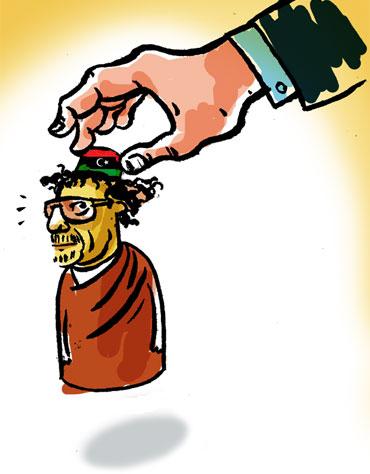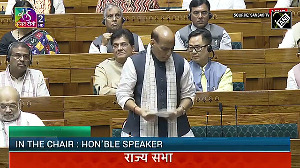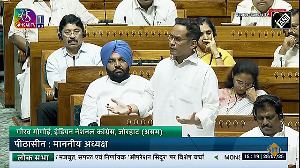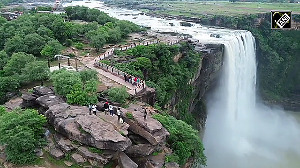"What are the rules for change of a regime?" asked my co-passenger. "Well, it is a bit complicated and there are no rules," B S Prakash started...
Illustration: Dominic Xavier
 'Leaders call for regime change' was the bold headline in The Financial Times that I unfolded as the plane took off from the airport in Rio de Janeiro. I looked out of the window for a moment to savour the familiar and yet eternally spectacular sights of the sea, the mountains, and the huge statute of Christ perched on top of the city.
'Leaders call for regime change' was the bold headline in The Financial Times that I unfolded as the plane took off from the airport in Rio de Janeiro. I looked out of the window for a moment to savour the familiar and yet eternally spectacular sights of the sea, the mountains, and the huge statute of Christ perched on top of the city.
As the plane ascended and the seatbelt sign came off, I glanced to my right to see the person seated next to me taking out a book, what looked like a thick manual with small print. It seemed to have sections, articles and clauses. As I took a peek at his book, he looked at my paper curiously and asked, "What regime, which leaders?" in good English.
It is not often that you run into English-speaking Brazilians on a plane in Brazil, and he looked very Brazilian, tall, tanned, a stylish suit, smart leather case et al. Instead of answering his question directly, I asked him whether he was interested in politics.
"Absolutely no," he said emphatically and added that he was a kind of an expert arbitrator in commercial disputes. "What I do is a rule-bound process," he said tapping his thick book, "but politics has no rules." "Very few, anyway..." I agreed and introduced myself in return.
Knowing now that I was a diplomat, he again reverted to his question and asked as to what 'regime change' really meant. Change of the entire Establishment or ruling structures in a country, I explained, and the news in the paper was about Libya and the three Western leaders of the US, UK and France declaring that Muammar Gaddafi's regime had to go.
"Can they insist on that? What are the rules for change of a regime?" he asked, in a straightforward way. "Well, it is a bit complicated and there are no rules," I started. I went into some of the obvious details as he seemed interested: in a democracy, the leaders got elected; in a monarchy the leadership was inherited; in a revolution a new regime could come into power overthrowing the old; in other variations normally an existing regime continued with the tacit even if resentful support of the citizens etc etc.
All this was the percepts and practices of wielding power in countries, but without 'rules' as such, I said.
"Not like President Lula being replaced by Dilma, is it?" he said laughingly referring to the recent change of government in Brazil after elections, and both of us agreed happily that there were indeed rules in countries like his and mine.
But he still seemed a little intrigued and frankly, so was I. It is one thing to follow international relations, another to try to articulate its principles which are highly elusive. The common sense notion that a government rules with the consent of the ruled is not necessarily a reality in practice, we agreed.
"But none of what you are saying is about leaders, in this case, the three Western leaders, asking for a change in another country. Can they do that?" he asked.
"It is complicated again," I started even though by now that had become my refrain. Of course, normally States or governments were not supposed to intervene in the domestic affairs of another country, and such a principle of non-interference was fundamental in the UN Charter and international law. Whatever happened in a country was its business and it was up to the people of that country to chose or at any rate suffer its leaders.
But norms and concepts in international relations were evolving and the earlier notion of absolute sovereignty and non-interference was being questioned too. The notion of total control by a government of its citizens was being contested, and could no longer justify an oppressive leader from harassing his own people, I explained, although by now I seemed to be lecturing him. But he was a keen listener and had closed his book.
"So is that the case with Libya?" he asked.
"Not only Libya," I replied. "There has been the case of the Ivory Coast too. New rules, so to say, in your language, are being invoked. The notion that in cases of massive human rights violations or harm to ordinary civilians, other countries have a right to intervene, to protect such people is being talked about."
"Are there clear rules of when and who can intervene?" he asked. "Not yet," I said, warming up to the subject. There are controversial ideas like the responsibility to protect innocent civilians as a duty of the international community. I also spoke about the genocide in Rwanda of eight hundred thousand Tutsis, the killings in Sarjevo and other cases which had led to these doctrines.
"But I keep hearing about the Congo, about Somalia, even saw something about Bahrain where our company has a case. How come no one is going there?" he asked.
All very legitimate questions and they are in my mind too, I admitted. The problems with some of the new concepts or 'rules' as he wanted to term them were that they were not universally applied. There was much selectivity depending on the interests of big powers, sometimes opportunism and often sheer ad hocism. But that was the nature of the beast in terms of the world order or disorder, which we had to live with.
"I thought the United Nations sets the rules on these issues," he said. He was now giving me an opportunity to hold forth on one of my favourite subjects, the need for reforms of the UN, specially the Security Council, also a subject on which Brazil and India have identical positions.
I told him that "yes" the UN had a role, though not a rule. Technically it was true that a resolution by the UN Security Council in cases of breach of international peace and security did confer some form of legitimacy or authority for external intervention. But these paradigms were evolving too.
When should the UN authorise such action: in a clear case of aggression, threat of aggression, breakdown of order, civilian suffering on a massive scale, genocide? When does a problem stop being internal and crosses over to being seen as a threat to international peace? Does it also not depend on the capacity and intention of the government concerned to resolve it?
And then there was the very character of the UN Security Council, as it stood now. It represented the power structure of 1945 at the end of the Second World War and not of today. It did not really provide an effective voice for countries like his and mine. The decisions taken there had some form of international legality of course, but did not necessarily embody principles of fair play or justice.
"Whew" he sighed. "No rules then in your line of work, Ambassador " he said wryly opening his book.
"Well, I would say that the reality in my line of work is the dynamics of power play rather than legality and morality," I admitted.
B S Prakash is the Indian Ambassador in Brazil and can be reached at ambassador@indianembassy.org.br
For more columns by Ambassador Prakash, please click here








